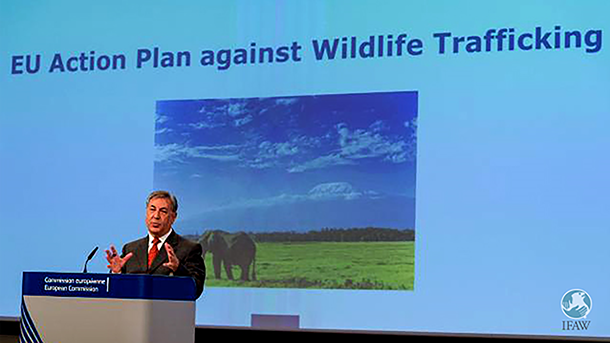

21/12/2017
Recent years have seen a dramatic surge in wildlife trafficking. An estimated 8 to 20 billion euro pass annually through the hands of organized criminal groups, ranking alongside the trafficking of drugs, people. Fuelled by corruption, inadequate governance, poverty and poor enforcement, as well as rising demand in some world regions, wildlife trafficking not only threatens the survival of some emblematic species, it also claims human victims, and deprives poorer communities of much-needed income. In parts of Africa, it serves as a source of funding for militia groups, threatening regional stability.
 |
On 26 February 2016 the European Commission adopted an EU Action Plan to tackle wildlife trafficking within the EU and to strengthen the EU's role in the global fight against these illegal activities. The Action Plan comprises 32 measures to be carried out between now and 2020 by the EU and its 28 Member States. It focuses on three priorities: Prevent trafficking and reduce supply and demand of illegal wildlife products; Enhance implementation of existing rules and combat organized crime more effectively by increasing cooperation between competent enforcement agencies such as Europol; Strengthen cooperation between source, destination and transit countries, including strategic EU financial support to tackle trafficking in source countries, help build capacity for enforcement and provide long term sources of income to rural communities living in wildlife-rich areas. It is also an important contribution to achieving the Sustainable Development Goals' dedicated target (Goal 15) to "take urgent action to end poaching and trafficking of protected species of flora and fauna, and address both demand and supply of illegal wildlife products". One year after adopting the EU Action Plan against Wildlife Trafficking, the Commission takes stock of progress and ensures commitment from key business sectors on the Plan's three dimensions - prevention, stronger enforcement and global partnership.
According to Report released on February 8, 2017 at High-level conference in Brussels, the implementation of 32 actions to tackle wildlife trafficking in Europe and globally is on track. Member States have prioritized enforcement with a big number of seizures of ivory, eels or rhino horn in the last months. National enforcement agencies and Europol have strengthened their co-operation, and Member States work closer together to raise awareness and build capacity against wildlife crime. EU Commissioner for Environment, Fisheries and Maritime Affairs Karmenu Vella said, EU Action Plan is making a real impact on the ground. Europe and its international partners are on the right track to eradicate wildlife trafficking, which threatens our biodiversity, costs human lives and robs innocent people of their livelihoods. But we still have a long way to go. It's encouraging to see the business sector on board. Only with the commitment and cooperation of everybody involved can we fight this crime that is becoming more organized and more ruthless.
The Commission has mobilized the EU business sector, in particular pet trade sector, aviation and courier sectors, to prevent that Europe is used as a market, transit point or source for illegal wildlife products. Work is advancing on many of the objectives of the Action Plan. With the Member States, the Commission is working on guidelines to ensure that neither the EU domestic ivory market nor the export of ivory from the EU contributes to international ivory trafficking. On the international front, the EU played a key role at the recent Conference of the Parties of the international convention regulating trade in endangered species (CITES). The EU participated for the first time as a Party, alongside all 28 Member States, speaking and voting as a block with a strong united voice. Parties agreed to trade restrictions and bans on a large number of species in need of greater protection, such as rosewood, pangolins, parrots and fish species. In 2017, work with our partners to implement CITES decisions will be a priority.
The EU has strengthened diplomatic efforts in the Far East, the most important market region, and worked closely together with partners to tackle the roots of the problem. Efforts were aimed at targeting organized criminal groups and looking at ways to reduce demand for illegal products, from rhino horn to pangolin scales. Being already the number one donor against wildlife trafficking in the world, the EU intends to increase its financial support to reinforce the capacity of developing countries to deal with that problem and to strengthen the activities of international organizations such as CITES or Interpol against wildlife crime.
Finally, the European Union has also contributed actively to include the issue of wildlife trafficking on the agenda of the G20 anti-corruption work and of the Financial Action Task Force, the main international body in charge of money laundering.
Phương Linh
(EC.Net source)